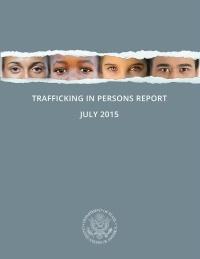
“Trafficking in persons is an insult to human dignity and an assault on freedom”
John Kerry, Secretary of State, USA.
American Secretary of State John Kerry just launched the 2015 edition of Human Trafficking Report that this year highlights the connections between human trafficking and global market.
Interestingly for Nepal, that remains in the Tier 2 group of nations that while do not fully comply with the TVPA’s minimum standards, are making significant efforts to bring themselves into compliance with those standards, the Report calls for amending or the drafting a new law against human trafficking for the country.
First of what let’s clarify the terminology. The Trafficking Victims Protection Act of 2000, TVPA, the American legislation under which the report is prepared every year, defines “Trafficking in persons,” “human trafficking,” and “modern slavery” as umbrella terms for the act of recruiting, harboring, transporting, providing, or obtaining a person for compelled labor or commercial sex acts through the use of force, fraud, or coercion..
The entire exercise is founded on the 3Ps paradigm: prosecute trafficking cases, provide protection and services to victims, and put improved measures in place to prevent crime from happening in the first place
Regarding the theme of this year, thinking of human trafficking in terms of global economy means having an opportunity to reconsider the way the global economy works. Too often we as consumer have no clue about the hidden stories behind mass consumptions goods and items.
The reports states “Human trafficking has no boundaries and respects no laws. It exists in formal and informal labor markets of both lawful and illicit industries, affecting skilled and unskilled workers from a spectrum of educational backgrounds. Victims include adults and children, foreign nationals and citizens, those who travel far—whether through legal or illegal channels—only to be subjected to exploitation, and those who have been exploited without ever leaving their hometowns”.
Here we are hearing a strong warning about the fundamentals of our consumeristic way of living. Too often we give for granted what actually is not especially when we forget that human lives at stakes, we forget that people are dying every single day as part of the global economy. The fact that the Report urges the private sector to take the lead against human trafficking is welcoming but I am wondering how long it will take to ensure that private sector actors culpable of human trafficking will be prosecuted and brought to justice. Certainly thinking of measure against human trafficking in terms of CSR shows disrespect to its victims
Now let’s look at the case of Nepal. The Report starts that “The Government of Nepal does not fully comply with the minimum standards for the elimination of trafficking; however, it is making significant efforts to do so”. One of the major recommendations is in terms of legislation as Human Trafficking and Transportation (Control) Act (HTTCA) in its current form is deemed inadequate. Among the three areas, prevention, prosecution and protection, the latter two are the weakest ones.
It is true that action of enforcement agencies show improvement in relation to the previous year with the Nepal Police Women’s Cell conducted 185 sex and labor trafficking case investigations under the HTTCA during the Nepali fiscal year, compared with 144 cases in the previous fiscal year with the
government prosecuting 454 alleged traffickers in the fiscal year, compared with 375 in the previous period.
At the same time the Report mentions that “in the course of police raids, there were reports police sometimes detained sex trafficking victims and subsequently returned them to their traffickers. Victims frequently retracted their witness statements following alleged threats by traffickers”.
The preventive side of the government’s action is probably the brightest with “the inter-ministerial National Committee for Controlling Human Trafficking (NCCHT) meeting regularly and issuing its second report on the government’s anti-trafficking efforts”.
Funding allocations against human trafficking has been distributed among the 75 districts of the country however, the government’s victim identification and protection efforts remained inadequate despite the fact that the Ministry of Women, Children, and Social Welfare (MWCSW) continued to partially fund eight rehabilitation homes and emergency shelters for female victims of gender-based violence, including trafficking.
Reading the analysis, the “glass looks more empty than full”: while it would be unfair to only criticize the government for its lack of action, much more could be done to put an end to human trafficking in the country.
To bring Nepal to Tier 1 country, those fully complying with the highest standards against human trafficking, a stronger political commitment will be paramount. After all, issues like human trafficking and child labor can be fought only through the highest will by the top politicians. For example, the Report states that “governments can model and encourage multi-stakeholder dialogue and partnerships to bring together businesses and anti-trafficking experts to generate ideas and solutions and promote voluntary responsible business conduct initiatives. Governments should set clear expectations for businesses on human rights issues and adopt policies that promote greater transparency and better reporting on anti-trafficking efforts in supply chains”.
It will also remain essential to forge stronger coordination and funding mechanism with civil society organizations working on the issue with the government providing direct funding to them so that these organizations will less rely on international donors.
And to give a push from the top to eradicate human trafficking for good, it would be a positive news if as per the Act’s provisions, the government of United States will restrict funding or put in action sanctions against countries in Tier 3 while at the same time it will increase its pressure on those country in Tier 2 to step up their efforts against human trafficking.
Commercial interests might prevail but it is worthy taking the risk to “upset” the global supply chains for good especially now that Obama administration is nearing its end, with more freedom of action from special interests.










Add new comment